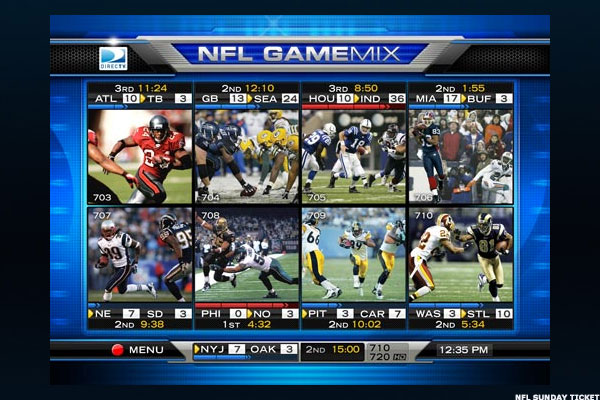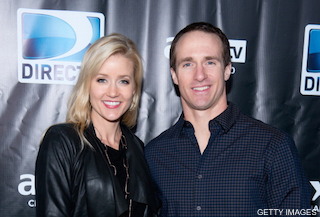By Jason Notte
The Street
DirecTV is just about worthless without NFL Sunday Ticket, which is why it needs to keep its football package nice and exclusive.
DirecTV is in the final year of a deal with the National Football League that paid the league $1 billion per season for the rights to its NFL Sunday Ticket package. It includes all out-of-market games, a channel of stats and scores, a mix channel featuring up to eight games at once, a channel that cuts games down to their most-essential 30 minutes, the RedZone channel of scoring drives and a fantasy football channel. The service also allows customers to stream games through their computer or mobile device, depending on the package a customer purchases.

Since 1994, DirecTV has had sole access to NFL Sunday Ticket and held onto it as other sports leagues developed out-of-town subscription packages of their own. Major League Baseball, The National Basketball Association, The National Hockey League and even Major League Soccer now offer such packages through various cable, satellite, Internet and wireless providers and allow fans to stream those games to any device they wish, but DirecTV was able to parlay Sunday Ticket into a business-to-business service that saw its branded dishes and televisions installed at bars, restaurants and other locations where folks gathered to watch games.
Sunday Ticket was a great deal for everyone involved 20 years ago, when satellite television was a novel new way to reach audiences. The NFL could give DirecTV rights to Sunday Ticket for as little as $700,000 a year and just watch the ratings pile up. It wasn't even such a bad option in 2009, when mobile technology and streaming were still fairly new concepts that the NFL could dabble in with help from DirecTV.

Now, the Sunday Ticket deal is a lopsided arrangement. Approximately 2 million DirecTV subscribers, or 10 percent of the total, purchase either the $240-a-year basic Sunday Ticket package or the $330-a-year MAX package. Meanwhile, according to media research firm SNL Kagan, 80 million customers subscribe to cable or satellite providers that aren't DirecTV. Even if only 10 percent of that audience subscribed to NFL Sunday Ticket, it would quadruple DirecTV's Sunday Ticket subscriber base.
Shockingly DirecTV doesn't seem to care what the NFL does from here: As long as the satellite provider doesn't have to pay more than $1 billion a year for what it's currently offering. DirecTV Chief Financial Officer Pat Doyle said earlier this year that he would rather share Sunday Ticket with cable or even drop it all together to prevent paying double the asking price. Then again, his company is getting squeezed by ESPN, Fox Sports and others for subscriber fees that keep jacking up the costs of service.
DirecTV shouldn't be nearly so cavalier about prizing cash over Sunday Ticket exclusivity. AT&T's $48.5 billion bid for DirecTV earlier this year basically hinges on Sunday Ticket staying in house. Then, AT&T could bring its 11.3 million U-Verse cable customers into the Sunday Ticket mix, as well as its second-in-the-U.S. mobile subscriber base of more than 60 million. But all of that is contingent on the NFL actually renewing DirecTV's NFL Sunday Ticket deal. DirecTV's been optimistic about that prospect and has continued negotiating, but there's been no definitive word from the NFL about its prospects.
There's reason for that optimism. For one, any expansion into cable or satellite beyond DirecTV would put the NFL a step further into a shrinking industry. As SNL Kagan reported earlier this year, cable and satellite subscriptions feel for the first time in history last year. Cable and satellite providers lost 251,000 subscribers last year. Though research firm IHS notes that DirecTV and Verizon actually gained subscribers in 2010, other cable and satellite customers lost more than 2 million customers combined.
Meanwhile, the NFL has had a somewhat conflicted relationship with multichannel television in general. The NFL has already placated other cable and satellite partners including Dish Network, Verizon, AT&T U-Verse, Cox and Cablevision by offering a version of Sunday Ticket's RedZone Channel on their systems and giving them access to the NFL Network. However, it just nullified much of the NFL Network's value by taking $275 million from CBS to broadcast former NFL Network property Thursday Night Football this season. It charges ESPN more than $1 billion per year for Monday Night Football -- the only weekly game not regularly available through the networks -- but continues to give viewers plenty of incentive to cut the cord on multichannel services by making games available through free networks or via mobile and streaming services.

That's exactly the option that should keep DirecTV execs up at night. According to the the Commerce Department's National Telecommunications and Information Administration, 72.4 percent of U.S. households (88 million) have high-speed Internet access. A 10 percent share of that audience alone would give Sunday Ticket nearly 9 million subscribers and give the NFL nearly five times the reach of its current deal with DirecTV.
If NFL takes Sunday Ticket mobile, it could simply build on the $5-a-month live streaming deal with Verizon Wireless that gives customers exclusive access to streamed games through the NFL Mobile app. DirecTV knows it has no qualms about separating its offerings from standard television entirely, as it allows DirecTV to sell Sunday Ticket as a mobile streaming package for the same $330-a-year cost of its premium Max service -- without the burden of a two-year satellite subscription. According to the Pew Research Internet Project, 56 percent of Americans have smartphones and represent the broad potential audience for both the NFL and its proud partners at Verizon -- which already has a whopping 110 million subscribers of its own. The league also allows DirecTV to offer modified Sunday Ticket packages to customers who stream through desktop computers or game consoles including Microsoft's XBox 360 and XBox One or Sony's (SNE_) PlayStation 4.
That's why nobody outside of DirecTV is downplaying the fact that Google has emerged as an outside contender for Sunday Ticket rights. Though the NFL continues to work with both Microsoft and Verizon on its online and mobile options, Peter Kafka at All Things D says that Google and its video providers at YouTube have been in talks with the NFL about how to make an all-streaming Sunday Ticket a reality. That move would not only continue Sunday Ticket's tradition of helping the NFL embrace and explore new technology, but it would also give the league a partner with deeper pockets than DirecTV ever had. Google would also give the NFL the run of an ecosystem that includes YouTube, Android-powered mobile devices, Chromebooks and even Google Glass.
Last fall, the NFL drew 205 million unique viewers in 81 percent of U.S. television homes. The 17.6 million fans it drew per regular-season game is more than Major League Baseball draws for the World Series or what the National Basketball Association brings in for its finals.

Overall, Fox, CBS and NBC pay the NFL $28 billion -- or roughly $1 billion a year -- for broadcast rights through 2022. ESPN pays $1.9 million each year -- or more than double what any network pays for a season of Major League Baseball -- just to host Monday Night Football. Meanwhile, the networks are more than happy to cough up the money, as 34 of the 35 most-watched television shows in the fall of 2013 were NFL games.
The NFL knows it can get more than $1 billion per season for its Sunday Ticket package, but it also knows that few other partners can offer the access to businesses that DirecTV has in recent years. The satellite provider's business wing has made it incredibly easy for bars, restaurants, gyms and other locations to set up its service, get airing rights, tack on Sunday Ticket, MLB Extra Innings, NBA League Pass or other packages and draw tons of sports fans to league games. Those businesses get patrons and the NFL gets both eyeballs and ever-growing brand recognition and familiarity.
For a league that has seen revenues reach nearly $10 billion largely on the strength of television, that working relationship is something it would have to think long and hard about giving up. If DirecTV met the league at least halfway, it would be a great way of showing the league its value while retaining a service that makes its dishes a must-have for many football fans.
With this much on the line, DirecTV has nothing to lose by going for it. If DirecTV keeps playing its negotiations conservatively, however, it's setting itself up for a big loss.
More From TheStreet.com:
-- Why Craft Beer At The Ballgame Is A Big Deal
-- Tim Hortons Coffee Can't Perk Up Burger King
-- 10 Most Bikeable Cities In The U.S.




